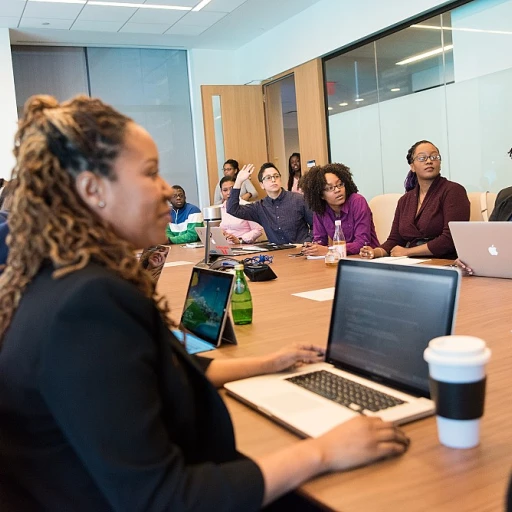
Understanding the Role of a Chief Human Resources Officer
Importance of Leadership in Human Resources
In any organization, the Chief Human Resources Officer (CHRO) plays a vital leadership role that extends far beyond traditional HR functions. With the rapidly changing landscapes of business and technology, the CHRO is not simply a steward of personnel management, but a key strategic partner in steering the company’s growth and innovation efforts.
As businesses continue to evolve in a digital-first world, the CHRO must integrate human resources strategies with broader business goals. This involves aligning the talent strategy with the company’s marketing and business objectives, ensuring that the workforce is equipped to support new initiatives in digital marketing, client engagement, and social media outreach.
The CHRO also plays a crucial role in fortifying a company’s brand identity—internally and externally. By fostering an organizational culture that reflects the brand’s values and mission, the CHRO helps to cultivate a team that is aligned with the company's strategic vision. A successful HR strategy involves collaboration across departments, including marketing, to ensure that the company conveys a consistent message to both its employees and its clients. This is essential for agencies aiming to build trust with potential clients through consistent and credible business practices.
Furthermore, effective project management is critical for the CHRO as they implement HR strategies that support business goals. Whether it's managing talent acquisition or orchestrating training programs, a well-structured plan helps HR leaders address both immediate and long-term workforce needs. For aspiring CHROs, gaining expertise in strategic HR planning and cross-departmental coordination can chart a prosperous career pathway. Interested in learning more? Explore how to craft effective business models for HR leadership here.
Key Skills for a Successful CHRO Career
Essential Skills for a Chief Human Resources Officer
The journey to becoming a successful Chief Human Resources Officer (CHRO) is driven by mastering a range of skills that go beyond traditional HR functions. In a landscape constantly shaped by digital transformation and strategic demands, aspiring CHROs must hone specific abilities to excel in this leadership role.
Key skills include:
- Strategic Planning: CHROs must be adept at aligning HR strategies with overall business goals. This involves a deep understanding of business, marketing, and agency dynamics to foster an environment where talent management contributes to the organization's growth.
- Digital and Content Proficiency: In the modern era, digital literacy is crucial. CHROs must understand digital marketing strategies, social media, and content marketing to effectively invite and retain talent. Being able to lead HR initiatives that incorporate digital solutions can greatly enhance employee engagement.
- Client and Audience Insights: Just like in marketing agencies, knowing your audience is vital. CHROs should apply this mindset to internal clients — their employees. Understanding employee needs, cultural fits, and career aspirations helps in crafting personal development plans that align with the agency's objectives.
- Project Management and Team Leadership: With responsibilities that span from recruitment to compliance, CHROs must possess strong project management skills. This ensures that HR projects are delivered efficiently and teams are guided effectively through change.
- Analytical and Metric-Driven: A CHRO should leverage HR metrics to inform decision-making. Being able to interpret and act on data bolsters the department's contributions to the agency's bottom line.
These skills are integral to the CHRO's ability to navigate the evolving HR landscape effectively, ensuring that the HR function not only attracts and retains top talent but also contributes to the strategic success of the agency's clients and overall brand.
Navigating Challenges in Human Resources Leadership
Overcoming Obstacles in HR Leadership
Navigating the role of a Chief Human Resources Officer (CHRO) comes with its set of unique challenges. The complexity of leading a diverse team, managing change, and maintaining a strong company culture in an ever-evolving business environment requires strategic prowess. To lead effectively, a CHRO must balance multiple responsibilities, often requiring a deep understanding of digital strategies and marketing concepts. It becomes crucial to articulate a clear HR plan that aligns with the company's overall business objectives. Here are some common challenges and ways CHROs can address them:- Adapting to Technological Advances: With rapid technological changes, HR leaders must embrace digital transformations. Implementing HR technology solutions can streamline processes, improving both efficiency and employee satisfaction.
- Ensuring Employee Engagement: Cultivating a positive workplace atmosphere is essential. Strategies like content marketing and social media engagement can play a vital role in boosting employee participation and morale.
- Managing Diversity and Inclusion: As organizations strive to reflect a diverse client base, ensuring that hiring practices are inclusive is crucial. A solid diversity strategy not only helps appeal to potential clients but also strengthens the brand's reputation.
- Talent Acquisition in a Competitive Market: In the agency industry, where talent drives the brand's competitive edge, creating an enticing value proposition is essential. This often involves a content strategy that highlights workplace culture and career growth opportunities.
- Aligning with Business Goals: Effective CHROs must understand the business's marketing strategies and client needs to align HR initiatives with corporate goals. This alignment helps agencies to efficiently utilize their marketing budgets and optimize performance.
The Evolving Landscape of Human Resources
Redefining HR Strategies in a Fast-Paced Digital World
The landscape of human resources is rapidly evolving, and with it comes a need for innovative strategies that align with today's digital age. As a Chief Human Resources Officer (CHRO), creating an agile HR function that supports your organization's objectives is paramount. In the realm of marketing agencies and their clients, this evolution is crucial for staying competitive. To navigate these changes effectively, a CHRO must consider several aspects:- Leveraging Digital Tools: Incorporating digital platforms and tools into HR processes can significantly enhance efficiency and improve engagement. Marketing agencies, for instance, heavily rely on digital marketing and content strategies to foster client relationships. Similarly, HR teams can harness digital solutions to manage recruitment, onboarding, and training.
- Data-Driven Decision Making: In line with content marketing strategies employed by agencies, HR leaders must utilize data to drive decisions. Analyzing workforce data can provide insights into employee performance, satisfaction, and areas for improvement. This alignment with data-centric practices not only optimizes HR functions but also complements the agency’s need for evidence-based strategies.
- Fostering a Culture of Innovation: Just as marketing strategies adapt to new trends, HR approaches must encourage a culture of innovation within the organization. Encouraging cross-departmental collaboration can inspire creative solutions and keep the organization at the forefront of industry developments.
- Enhancing Employee Engagement and Retention: Engaging the workforce through tailored content akin to a targeted social media marketing strategy can boost morale and retention. Personalized communication and recognition programs are pivotal in nurturing a motivated and loyal team.
Building a Strategic HR Function
Creating a High-Impact Human Resources Strategy
The role of a Chief Human Resources Officer has expanded significantly, intertwining HR strategies with core business objectives. Today, building a strategic HR function requires a deep understanding of digital and content strategies as well as the ability to integrate these into the broader company goals. Here's how you can craft a high-impact HR strategy:
- Align with Business Goals: Begin by ensuring HR initiatives align with the business's marketing and operational plan. This means taking into account the company's marketing strategy, such as agency campaigns, social media marketing, and content strategy, to drive employee engagement and retention.
- Enhance Talent Acquisition: Develop strategies to attract top talent by leveraging your company's brand and media marketing efforts. Create a strong employer brand that resonates with potential clients and job seekers alike. This may involve collaboration with marketing agencies to design an attractive recruitment campaign.
- Focus on Employee Development: Implement training programs that reflect the company's innovative social media and digital marketing standards. By investing in employee growth, you elevate the capabilities of your team, helping them contribute more effectively to marketing projects and agency goals.
- Foster a Digital Culture: As industries move towards digital business models, CHROs must integrate technology and digital transformations within the HR framework. Encourage a digital-first mindset, aligning with the content marketing and digital strategies of the marketing team.
- Measure Impact: Use data-driven insights to track the success of HR initiatives. Collaborate with marketing teams to employ analytics tools that measure the effectiveness of HR campaigns, akin to monitoring paid advertising and marketing campaign metrics.
By integrating these strategies, a CHRO can play a pivotal role in enhancing the full-service offering of any agency or business, ensuring HR functions are not only supportive but instrumental to achieving the central business objectives.
Career Pathways and Opportunities for Aspiring CHROs
Exploring Career Pathways
Aspiring to become a Chief Human Resources Officer (CHRO) often means navigating a dynamic path filled with varied opportunities. As the landscape of human resources continues to evolve, there are numerous avenues to explore that align with advancements in digital tools and strategic marketing techniques. These elements are advantageous for anyone seeking to excel in this key leadership role within a marketing agency or any business framework. Understanding the importance of integrating a marketing mindset into HR functions is crucial. CHROs can benefit from understanding the strategic importance of aligning HR strategies with an agency’s core business objectives. This alignment helps in effectively managing client relations and enhancing the overall brand image. Here are some potential career pathways for aspiring CHROs:- HR Generalist Roles: Gaining experience in various HR functions can provide a holistic view of the department, laying a strong foundation for future leadership positions.
- Talent Acquisition: With agencies constantly seeking to attract top clients and build a proficient team, expertise in recruitment strategies is invaluable.
- Learning and Development: Developing training programs that reflect the company's strategic goals helps in nurturing talent and improving team performance, ultimately contributing to client satisfaction.
- Strategic HR Roles: These roles focus on aligning HR initiatives with broader business strategies, fostering an environment that supports the company’s mission and its clients’ needs.













